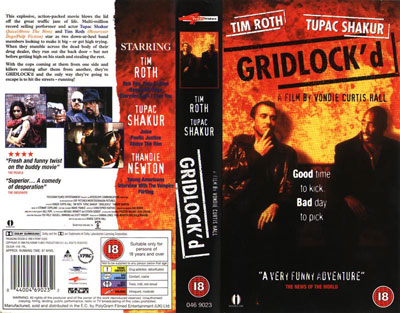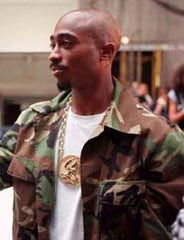|
Best
site: The COINTELPRO Papers
COINTELPRO:
FBI Activities in Hollywood
Cointelpro
Revisited - Spying & Disruption
COINTELPRO
STILL LIVES!
Armies
of Repression: The FBI, COINTELPRO and Far Right Vigilante
Networks
COINTELPRO:
The Sabotage Of Legitimate Dissent
|

A film directed by
Vondie Curtis Hall (1997)
Good time to
kick; Bad day to pick

Starring Tupac
Shakur (above), Tim Roth and Thandie
Newton
GRIDLOCK'd is a
movie that demonstrates with a grim understated humour, the
paradox of a nation that consumes more narcotics than any
other on the planet, and yet cannot provide decent
healthcare for its own people.
The film features
the British actors, a grizzled Tim Roth and the beautiful
Thandie Newton; as well as the late lamented Tupac Shakur.
The three actors play a trio of be-bop musicians, with
Tupac's bass and Roth's jazz piano framing the lyrics of
poetess Cookie, played by Thandie Newton. Although shown as
a central part of their little nuclear family, she spends
most of the film featured in flashbacks. During the action
she's actually lying in a hospital bed recovering from the
after-effects of joining the boys in a quick fix.
That is one of the
suprising elements of the film; that instead of featuring
Hollywood's favourite drug, the white powder scooped up and
advertised long before Scarface; GRIDLOCK'd pitches us into
the bleak, surreal world of the heroin addict. spends most
of the film featured in flashbacks. By featuring the group
as one dealing in a sort of jazz poetry, rather than rap or
rock, we see grim reality seen through the dreamhaze of an
opiated bubble; with Stretch, Cookie and Snow the inheritors
of the romantic lineage of Billie Holiday and Charlie
Parker, in a long line of celebrated boho junkies. Cookie's
dreamworld represents the secret of heroin's fatal appeal;
to souls lost in a dimension where the rythms of music
become the lifeblood of your heart. How you can be 'gone' in
the most total way, where nothing affects you; the poverty,
the disappointments, the rip-offs; or public indifference to
artists who only become romanticised idols in the public
consciousness when they have long been laid to rest in a
pauper's grave. The freedom to escape if only for a few
hours, in a little square wrap of paper.
The film is cut
three ways; between straightforward action, social realism
(or the nearest that Hollywood is ever likely to reach); and
scenes where the morphic silence of men sharing an addiction
to the dreamworld are captured. These three strands are
glued into one fibre by the relationship between the three
protagonists. Cookie's absence for a large part of the
'action' reveals an aspect of the ultimate 'buddy' movie
where two men travel through the underworld, without moving,
feeling, or thinking beyond the hit, and how to get it. The
relationship between the characteristically screwed-up South
London intensity of Roth, who plays the demented keyboard
junkie on a one way trip to oblivion; and his bond with the
good natured and sensible Snow, played by Tupac; hangs
together in a dynamic peculiar to musicians, with Cookie as
the almost invisible powerful fulcrum.
Shocked by Cookie's
OD, Snow is determined to clean himself up - and it is this
wish to get into a detox programme that provides the most
real and relevant action in the film. The 'gridlock'
referred to in the title is the state of the medical and
welfare systems in the US, which are mired in bureaucracy;
designed, it seems, to hold off the poor from demanding
healthcare until they are dead. There is the tragi-comic
sight of Tupac and Tim as they stumble in a pinned- out
state around the detox clinics, casualty areas, and the odd
government office trying to get on a rehab programme. It is
clear that the filmmaker's sympathies are placed more on the
side of the addicts than their controllers across the
counters and behind the hatches.
GRIDLOCK'd could
easily have been yet another gangsta, gear and guns movie,
especially with the rep that preceeds the rapper, but the
'action' element seems almost tagged on as an afterthought.
Maybe it was added later, to spice up what would no doubt
have been perceived by the Hollywierd industry as a worthy
social movie best left to Europeans. The Loach-like scenes
are interspersed with the occasional chase through the
streets, after the local superfly realises that they have
stolen 'his' stash. Being junkies rather than coke-heads,
neither muso owns a car, thankfully sparing us the usual
cliched autogeddon pile-ups.
Although the 'stash'
is every junkie's dream, a free parcel of powder, it is
perhaps more of a McGuffin, used to provide a parallel
chase, and the image of ultimate temptation to our stoned
heroes. The film is fairly novel for a glossy Hollywood star
vehicle, featuring lots of 'unattractive' - for which, read
real - people, and the sort of places from the underbelly of
the Shining City which are rarely depicted.
The presence of
Tupac in a film dealing with this subject has a certain
poignance as well. He was the nephew of a woman called
Assata
Shakur, who
was central in the attempts to set up detox clinics for the
junkies in the Bronx, in the 70's. and was subsequently
persecuted by the FBI under the COINTELPRO
programme and driven into exile in Cuba. Most actors make
unconvincing musicians, and vice versa, but Tupac doesn't
try too hard, which is probably the hardest thing to master.
It is only at the
end of the film when we finally see the band performing in a
club; that we get a glimpse into the power of music, more
potent than any drug. We become aware, perhaps too late,
like the musicians themselves; that all heroin really does
is fill in the space, the empty time; between those peaks of
sublime expression and communication connecting the artist
and audience.
Tupac finishes the
performance with a piece of jazz poetry, that perhaps
demonstrates the unspoken link between rap and previous
urban art movements which have emerged from the ghettos and
projects of the Americas. It also leaves you to ponder on
what he might have become if a hail of bullets had not
removed him from the arena of the living; and silenced yet
another voice of the urban, criminalised poor. It is a far
more mature, and deeper film than 'Juice', in which he
played a stereotyped, predictable junior psycho-gangsta;
especially when compared, for instance, to Boaz Yakim's 1994
film Fresh, which dealt with a similar subject on a much
more profound level.
Although this film
could not be described as a movie milestone, it is worth
watching for the understanding hidden in the detail; as well
as its unpredictable and unusual perspectives on the
so-called sub-cultures of modern Amerika.
This review will
soon be followed by an overview of the questions which still
hang over the death of Tupac. Further information on the
continuing COINTELPRO
activities of agencies of the US government in the pages of
FLAME.
©2000
|
